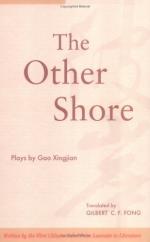|
This section contains 365 words (approx. 1 page at 400 words per page) |

|
The Other Shore Summary & Study Guide Description
The Other Shore Summary & Study Guide includes comprehensive information and analysis to help you understand the book. This study guide contains the following sections:
This detailed literature summary also contains Bibliography on The Other Shore by Gao Xingjian.
The play's title refers to the concept of "paramita" or "nirvana," the land of enlightenment in Buddhism. According to Buddhist belief, humans experience an actual visible life full of suffering, but by living according to the virtues of "paramita"morality, patience, meditation and wisdomthey can cross the "river of life" to the other shore and experience enlightenment.
The Other Shore reveals many themes and traits characteristic of Xingjian's writing. Thematically, the play addresses issues of collectivism and individualismthemes that Xingjian has addressed throughout his career, and ones that are considered to be highly political in the Communist Chinese context. The Other Shore also addresses the more personal theme of salvation: the actors cross the river of life to reach nirvana, only to find that nirvana does not exist.
Stylistically Xingjian is considered avant-garde; his works seldom follow conventional narrative modes, and The Other Shore is no exception. The play comprises a series of seemingly disconnected scenes with no discernible plot or character development. The play clearly shows the influences of Jerzy Grotowski, the Polish dramatist who devised the concept of "poor theatre," in which the "non essentials" of theater such as costumes, sound effects, makeup, sets, and lighting are eliminated as a way to emphasize and redefine relationships between actors and the audience. In The Other Shore, the actors take on multiple roles and must quickly change personas several times in the course of the play. In conventional theory of acting, best represented by Constantin Stanislavski's theory of "total immersion," an actor fully takes on the persona of the fictional character. In The Other Shore, the actors never fully leave their role as actors. The purpose of the play is not to reproduce life realistically, but rather to provide a hypothetical world that allows the actors to continually reinterpret their roles.
While the play itself has not garnered any awards, Xingjian has been widely acclaimed as a writer. Prior to his being awarded the Nobel Prize for Literature in 2000, he was the recipient in France of Chevalier de l'Ordre des Arts et des Lettres in 1992; Prix Communauté francçaise de Belgique in 1994; and Prix du Nouvel An chinois in 1997.
Read more from the Study Guide
|
This section contains 365 words (approx. 1 page at 400 words per page) |

|



